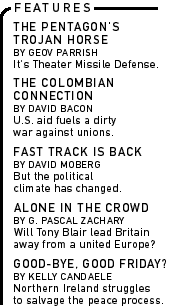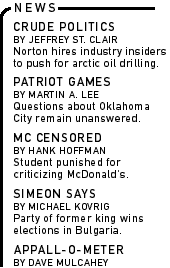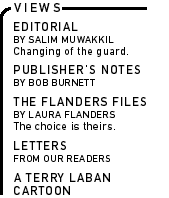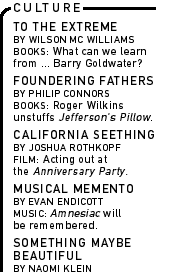

|

|

|

|
|
|
| |
|
|
|
Amnesiac It has been four years since the incident--four years since OK Computer, riding a tidal wave of critical acclaim, inspired every media outlet with a penchant for hyperbole to dub Radiohead "The Best Band in the World." But then the British group disappeared into the studio for nearly three years before resurfacing with 2000's Kid A. It came out of the clouds, without a radio single or Buzz Clip to herald its arrival, topped the charts briefly and fluttered away again. And while the echoes of its impact still resonate, fans and critics alike have been left to wonder: What happened to those five young gentlemen from Oxford? Amnesiac, Radiohead's second album in less than a year, leaves little in the way of clues. Allegedly cobbled together from spare parts left lying around the studio after Kid A, the album is a disorienting, schizophrenic listening experience that lives up to its title. Kid A's genius lies in its seamless flow, in the way one track melts into another like two amoeba making senseless love. Amnesiac shows no such attention to sequence: Its songs switch mood and style constantly, and one feels lost trying to navigate its sonic terrain. If the album's title implies a separation from the past, abandoning the album-length arcs of Kid A and OK Computer may be Radiohead's first step toward reclaiming their future. But it's a step backward as well--there will be singles and videos on MTV and a globe-spanning tour of sold-out performances. The question is no longer whether Radiohead are the best band in the world, but rather, who are Radiohead and what do they want? Awake. Where are we? Bourbon Street. Drunk at dawn, wandering through a dimly-lit alley when the sound of "Life in a Glass House" hits. A stumbling piano line, horns that wander inebriated circles around Thom Yorke's fragile tenor--"Once again, packed like frozen food and battery hens, think of all the starving millions." A skewering stab at rock stardom? Are we the hens packed into cramped concert halls, trading ticket stubs for a chance at vicarious revelation? Or maybe we're the critics "hungry for a lynching." Amnesiac is full of images of confinement: glass houses, crushed tin boxes, trap doors "that you can't come back from." Amnesiac is also replete with images of revolution: spinning plates, revolving doors, going "round and round and round." "Be constructive," Yorke demands (of himself?) on "Dollars and Cents," his sentiment echoing into the dark spaces constructed by the tune's sparse instrumentation. As feedback rumbles slowly into the mix and the track gains momentum, Yorke's voice sails into its upper register: "Why don't you quiet down? Why don't you quiet down?" This is not a request; it's a mantra. These are not lyrics; these are tattoos carved into a body of work to remind the artist who he is, to help him get a foothold on a mountain that threatens to unleash a landslide at any moment. What's happening here? Many fans insisted that Amnesiac would mark Radiohead's return to their early guitar ballads; Kid A was just a diversion, an experiment. They were wrong. As if to prove this point, "Knives Out" begins with a series of familiar chorused arpeggios, only to introduce the lines, "I want you to know, he's not coming back, look into my eyes, I'm not coming back." Is this Yorke's eulogy for mid-'90s Radiohead, with its oh-so-pretty guitars and yearning melodies? Or for his mid-'90s self, the bleached-blonde rocker with uneven eyes who rode around a day-glo grocery store singing about his "fake plastic girl"? He seems unsure. "I Might Be Wrong" is an admission of doubt set to the catchiest groove on the album. A simple blues figure, sequenced to repeat like a synth riff, starts over a static drone. Drums kick in, and we're compelled to jerk and sway like ecstasy-fueled robots. "I might be wrong, I might be wrong," Yorke recites, and we hope he is; this has the swagger of young Mick Jagger and the textured depth of Kid A's finest moments. But if Amnesiac is about forgetting, no dream can survive beyond dawn. To the ping-pong beat of a clanging electronic drum and mesmerizing synth loop, Yorke declares matter-of-factly on "Packt like Sardines into a Crushed Tin Box" that "after years of waiting, nothing came ... you realize you're looking, looking in the wrong place." Yorke's being utterly human, vulnerable and angry all at once: "I'm a reasonable man, get off my case, get off my case, get off my case." Pessimists have dismissed Amnesiac as "Kid B," but that does a disservice to Kid A's power. Amnesiac isn't nearly as boldly drawn or well-defined, but neither is it a haphazard collection of B-sides and outtakes. If Yorke's lyrics betray a wandering disconnection with his world, the musical eclecticism on display is equally untethered. But what of the obsession with confinement and repetition? Are Radiohead really trapped, with their legions of loyal followers and carte blanche to indulge their muse? I have no idea. Or maybe I just forgot.
|

